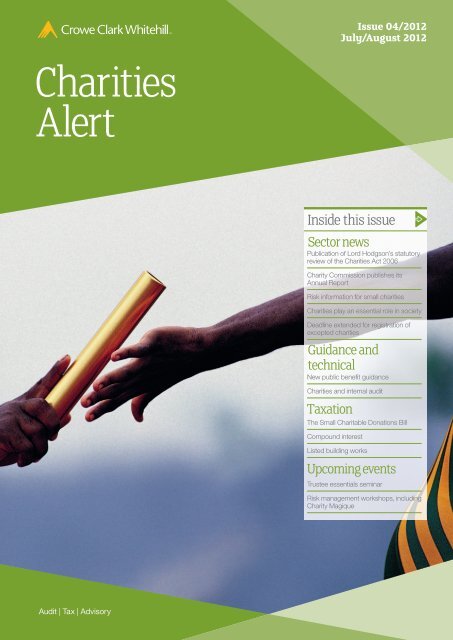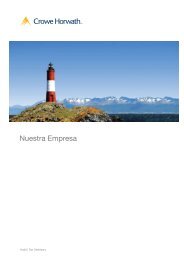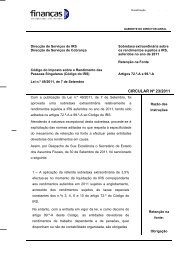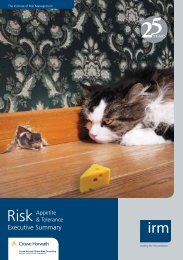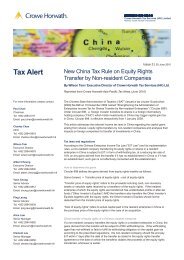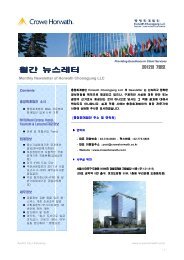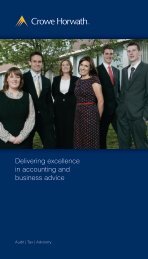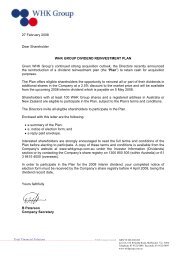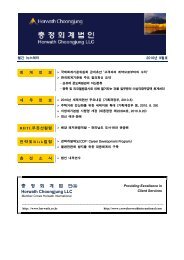Charities Alert July/August 2012 - Crowe Horwath International
Charities Alert July/August 2012 - Crowe Horwath International
Charities Alert July/August 2012 - Crowe Horwath International
Create successful ePaper yourself
Turn your PDF publications into a flip-book with our unique Google optimized e-Paper software.
Issue 04/<strong>2012</strong><br />
<strong>July</strong>/<strong>August</strong> <strong>2012</strong><br />
<strong>Charities</strong><br />
<strong>Alert</strong><br />
Inside this issue<br />
Sector news<br />
Publication of Lord Hodgson’s statutory<br />
review of the <strong>Charities</strong> Act 2006<br />
Charity Commission publishes its<br />
Annual Report<br />
Risk information for small charities<br />
<strong>Charities</strong> play an essential role in society<br />
Deadline extended for registration of<br />
excepted charities<br />
Guidance and<br />
technical<br />
New public benefit guidance<br />
<strong>Charities</strong> and internal audit<br />
Taxation<br />
The Small Charitable Donations Bill<br />
Compound interest<br />
Listed building works<br />
Upcoming events<br />
Trustee essentials seminar<br />
Risk management workshops, including<br />
Charity Magique
<strong>Charities</strong> <strong>Alert</strong> Issue 04/<strong>2012</strong><br />
Given that a number of the<br />
recommendations require primary<br />
legislation in order to become law, it<br />
is unlikely that a new Bill would be<br />
passed before 2015.<br />
Sector news<br />
Publication of Lord<br />
Hodgson’s statutory<br />
review of the<br />
<strong>Charities</strong> Act 2006<br />
In <strong>July</strong>, Lord Hodgson published<br />
the findings from his review of the<br />
<strong>Charities</strong> Act 2006. The review had<br />
been commissioned in line with the<br />
government’s commitment to ensuring<br />
that the Act was reviewed within five<br />
years of being enacted.<br />
Lord Hodgson’s report, “Trusted and<br />
Independent: Giving charity back to<br />
charities” has generally been well<br />
received within the sector. The next<br />
stage will be a review by Parliament<br />
followed by the Public Administration<br />
Select Committee’s consultation, in<br />
which Lord Hodgson’s statutory review<br />
is the centrepiece. The consultation<br />
runs until 14 September <strong>2012</strong>.<br />
Given that a number of the<br />
recommendations require primary<br />
legislation in order to become law,<br />
it is unlikely that a new Bill would be<br />
passed before 2015.<br />
In reviewing the Act and making<br />
recommendations, Lord Hodgson<br />
was guided by seven basic principles,<br />
which included:<br />
<br />
<br />
<br />
<br />
the regulatory framework should<br />
allow trustees to use their own<br />
judgement, whilst reducing<br />
unnecessary bureaucracy and<br />
red tape<br />
charitable status should be<br />
regarded as a privilege and not<br />
a right<br />
both the sector and the regulator<br />
should remain independent of<br />
government influence<br />
there should be greater clarity<br />
in legislation and regulatory<br />
requirements to encourage<br />
compliance<br />
Charity Commission publishes its<br />
Annual Report<br />
The Charity Commission has published its latest Annual Report and Accounts. The<br />
report sets out how the Commission has delivered so far against its new strategic<br />
plan issued in January <strong>2012</strong> and how it has met the KPI objectives set out in its<br />
previous plan. The report also demonstrates how the Commission’s strategic<br />
priorities to encourage compliance and accountability and strengthen charities’ selfreliance<br />
have translated into its work with charities in 2011/12.<br />
The report highlights the Commission’s success in moving its services online, with<br />
99.9% of registrations in the year under review being online applications and the<br />
requirement since 2011 for all annual returns to be submitted online.<br />
Sam Younger, Chief Executive of the Charity Commission, noted that the regulator<br />
will need to build on these successes when the new strategy comes into force in<br />
October:<br />
“This report shows that we’re heading in the right direction – performing across the<br />
board, moving traffic online, creating excellent online advice – all these trends will<br />
need to continue if we are to maintain trust in charities while adjusting to reduced<br />
resources.”<br />
Risk information for small charities<br />
The Charity Commission has recently set up a web resource area for small<br />
charities. The area includes guidance on setting up and running small charities and<br />
a copy of the small charities constitution.<br />
The Commission has also published some web pages on risk specifically designed<br />
for small charities. The pages provide 10 useful questions charities should ask<br />
themselves to avoid problems, including areas such as:<br />
<br />
<br />
<br />
ensuring that the charity is working in line with its governing document<br />
making sure that all trustees are properly appointed<br />
the importance of preparing accounts and Trustees’ Reports.<br />
The pages also cover simplified risk management for small charities and how they<br />
can avoid typical risks.<br />
<strong>Charities</strong> play an essential role in society<br />
A recent survey conducted by Ipsos MORI on behalf of the Charity Commission has<br />
found that 37% of people felt charities played an essential role in society compared<br />
to 30% in 2010, and overall 96% of people felt that the charities’ role was essential,<br />
very important or fairly important. Overall public trust in charities remained high<br />
with a mean score of 6.7 out of 10. The research also continued to show that the<br />
overwhelming majority of people believed charities should provide the public with<br />
information on how they spend their money (96%) and on how they benefit the public<br />
(94%).<br />
The most common reason given for why some charities are trusted less was not<br />
knowing how their money was spent (36%), whilst the most common reason given<br />
for trusting a charity more was having seen or experienced what they do (38%).<br />
Other factors influencing ‘trust’ included whether people had heard of the charity or<br />
whether it was providing services within the local community.<br />
<br />
the voluntary principle should<br />
remain at the heart of the charity<br />
sector.<br />
Awareness of the Charity Commission and its work had also increased over the past<br />
six years with 55% of those interviewed having heard of the Commission compared<br />
to 46% in 2005.<br />
A number of the recommendations<br />
have provoked debate in the sector.<br />
Further details can be found here.<br />
Commenting on the report, Dame Suzi Leather said:<br />
“I am delighted that these research findings confirm that public trust and confidence<br />
in charities remains high. During these difficult economic times for charities, I hope<br />
the sector will take heart from this vote of confidence, and be reassured that the<br />
public recognises the essential role charities play in our society.”
<strong>Charities</strong> <strong>Alert</strong> Issue 04/<strong>2012</strong><br />
I am delighted that these<br />
research findings confirm that<br />
public trust and confidence in<br />
charities remains high.<br />
Deadline extended<br />
for registration of<br />
excepted charities<br />
The deadline for excepted charities with incomes below<br />
£100,000 to register with the Charity Commission has been<br />
extended from 1 October <strong>2012</strong> to 31 March 2014.<br />
As highlighted in our <strong>Charities</strong> <strong>Alert</strong> 05/2011, under the<br />
original provisions of the 2006 <strong>Charities</strong> Act excepted<br />
charities (including scout and guide groups, armed forces<br />
charitable funds and parochial church councils) with incomes<br />
over £100,000 had to register from 31 January 2009 with the<br />
Commission, but those with incomes under £100,000 were<br />
provided with an extended deadline.<br />
As part of Lord Hodgson’s recommendations following his<br />
review of the <strong>Charities</strong> Act, the registration for excepted<br />
charities is also likely to be reduced from £100,000 to<br />
£50,000 to £25,000 over a three year period.<br />
Guidance and technical<br />
New public benefit<br />
guidance<br />
The Charity Commission has released its revised guidance<br />
on public benefit. The guidance takes into account the<br />
findings of the Upper Tribunal case last autumn, and now<br />
states that it is only necessary for an entity to have charitable<br />
purposes to be regarded as a charity, rather than to be<br />
judged on the activities it undertakes, as stated by the<br />
previous guidance. A charitable purpose must fall within the<br />
list of purposes set out in the <strong>Charities</strong> Act 2006 and, more<br />
importantly, must be for the public benefit.<br />
The guidance has been provided in a new online format on<br />
the Commission’s website, making it easier for trustees to<br />
select the parts relevant to their organisation. It also sets out<br />
more clearly what the public benefit duties of charity trustees<br />
are, and indicates which areas of the guidance trustees are<br />
required by law to have due regard to and which parts are<br />
additional explanatory information.<br />
The guidance is subject to a three month consultation period<br />
which closes on 26 September <strong>2012</strong>. The Commission has<br />
requested responses from trustees on both the content<br />
of the guidance and the new online format and layout.<br />
Respondents are able to post responses and comments on<br />
the guidelines on a blog.<br />
Dame Suzi Leather, chair of the Charity Commission<br />
commented:<br />
“We have worked hard to write guidance that accurately<br />
reflects the law but is accessible for a charity trustee who just<br />
wants to know what to think about when making decisions<br />
that might affect their charity’s public benefit. We hope the<br />
online format will make it easier.”<br />
The new guidance will replace existing public benefit<br />
guidance and supplementary fee-charging guidance.<br />
Supplementary guidance on advancing religion, advancing<br />
education and relieving and preventing poverty will be<br />
reviewed in light of this consultation.<br />
The Commission has also published its legal analysis of<br />
public benefit for comment.<br />
We have provided further details on the revised guidance in a<br />
briefing note.<br />
<strong>Charities</strong> and internal audit<br />
An increasing number of charities are considering the need<br />
for an internal audit function, and thinking about what form<br />
this should take. Options range from employing a dedicated,<br />
in-house resource, to outsourcing the function to specialist<br />
suppliers. We have developed some initial guidance to help<br />
trustees weigh up their options in this respect and further<br />
details can be found here.
<strong>Charities</strong> <strong>Alert</strong> Issue 04/<strong>2012</strong><br />
Taxation<br />
The Small Charitable<br />
Donations Bill<br />
As highlighted in our previous <strong>Charities</strong> <strong>Alert</strong>,<br />
03/12, following a consultation period, the<br />
government published the Small Charitable<br />
Donations Bill on 21 June. Further details on the<br />
implications of the Bill can be found in our charity<br />
tax briefing note.<br />
Compound interest<br />
In <strong>July</strong>, the European Court of Justice (ECJ)<br />
released its decision as to whether compound<br />
interest was payable on Condé Nast/Fleming<br />
claims (under the Littlewoods case). The ECJ has<br />
rejected the company’s contention that they had<br />
any right to claim back compound interest under<br />
European Law and has referred the case back to<br />
the UK Courts.<br />
Having reviewed the wording of the judgement<br />
it seems likely that claims for compound interest<br />
will be dismissed once the case has been heard<br />
in the UK. Although this was always the likely<br />
outcome it will come as disappointing news to<br />
those charities that have applied for compound<br />
interest following settlement of their retrospective<br />
VAT claims.<br />
Listed building works<br />
HMRC has recently announced changes to the<br />
proposed listed buildings legislation. Where<br />
listed building consent had been applied for on<br />
or before 21 March <strong>2012</strong> the extension for zero<br />
rating on these works, where applicable, will<br />
now be extended to 30 September 2015. All<br />
other projects will continue to be subject to the<br />
standard rate of VAT on or after 1 October <strong>2012</strong>.<br />
Upcoming events<br />
Trustee essentials seminar<br />
We are delighted to be hosting the second in an occasional series of<br />
seminars exploring key issues for trustees to consider in the current<br />
climate. This will include an in-depth look at key areas that underpin<br />
the health of every charity coupled with other invaluable information for<br />
trustees.<br />
The seminar will take place on Monday 10 September <strong>2012</strong> between<br />
09.00 and 16.00 at our London office. There will be a charge of £50,<br />
plus VAT, to attend the event and registration is essential. Lunch and<br />
refreshments will be available.<br />
Space is limited on this course so please contact<br />
denise.peters@crowecw.co.uk to reserve your place or click here to<br />
obtain further information. Do pass this information to your trustees and<br />
also let Denise know if you would like to be invited to a future similar<br />
seminar.<br />
Risk management workshops,<br />
including Charity Magique<br />
We regularly run free half-day risk workshops covering best practice in<br />
risk management and a demonstration of Charity Magique, the webbased<br />
risk management tool tailored for charities. The next workshops<br />
are at our London office on 22 November and 29 November, from<br />
09.30 to 12.30, followed by buffet lunch.<br />
Please contact denise.peters@crowecw.co.uk if you would like further<br />
information or to book a place on either of the above dates. A maximum<br />
of two attendees per organisation may register for these workshops.<br />
Further information is available in our VAT briefing<br />
note.<br />
We hope you find <strong>Charities</strong> <strong>Alert</strong> of interest. If you have questions about any of the topics covered, please<br />
contact Pesh Framjee, Head of our Not for Profit group, or Sally Kirby, Editor of <strong>Charities</strong> <strong>Alert</strong>.<br />
Office locations and contacts:<br />
Cheltenham – Mike Hall<br />
01242 234421<br />
London – Pesh Framjee<br />
020 7842 7100<br />
Thames Valley – Alastair Lyon<br />
0118 959 7222<br />
Kent – Ian Weekes<br />
Maidstone<br />
01622 767676<br />
Tunbridge Wells<br />
01892 700200<br />
Midlands – Helen Drew<br />
0121 543 1900<br />
Manchester – Vicky Szulist<br />
0161 214 7500<br />
<strong>Crowe</strong> Clark Whitehill LLP is a member of <strong>Crowe</strong> <strong>Horwath</strong> <strong>International</strong>, a Swiss verein (<strong>Crowe</strong> <strong>Horwath</strong>). Each member firm of <strong>Crowe</strong> <strong>Horwath</strong> is a separate and independent legal<br />
entity. <strong>Crowe</strong> Clark Whitehill LLP and its affiliates are not responsible or liable for any acts or omissions of <strong>Crowe</strong> <strong>Horwath</strong> or any other member of <strong>Crowe</strong> <strong>Horwath</strong> and specifically<br />
disclaim any and all responsibility or liability for acts or omissions of <strong>Crowe</strong> <strong>Horwath</strong> or any other <strong>Crowe</strong> <strong>Horwath</strong> member. © <strong>2012</strong> <strong>Crowe</strong> Clark Whitehill LLP<br />
This information is published without the responsibility on our part for loss occasioned to any person acting or refraining from acting as a result of any information published herein.


